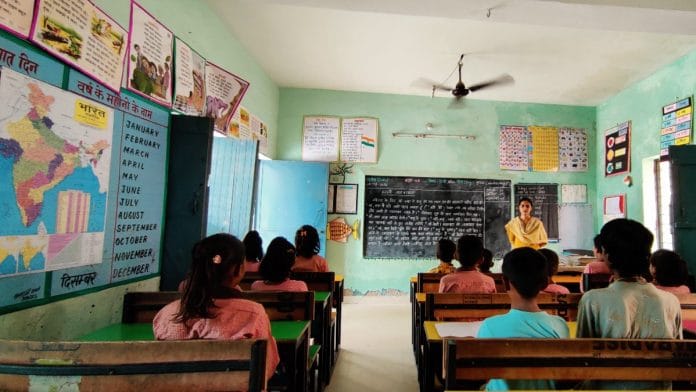Thank you dear subscribers, we are overwhelmed with your response.
Your Turn is a unique section from ThePrint featuring points of view from its subscribers. If you are a subscriber, have a point of view, please send it to us. If not, do subscribe here: https://theprint.in/subscribe/
The teaching of history has again been in the news, and there has been some debate on historians failing to engage with public history. There is certainly a connection between polarising public narratives of history, and wider polarization in society, and it is not unnatural to blame the historian. HG Wells, in post-World War I Europe, is supposed to have laid the blame for the war on the teachers of history who peddled nationalism and glorified war.
Teachers of history like me grapple daily with the responsibility of teaching historical narratives that promote truth as well as peace. Here, I would like to offer a few thoughts on the challenges we face.
There are the obvious problems of history texts which promote ‘overweening pride’ and hatred or contempt for one’s neighbour (or neighbouring nation) – which, as has been pointed out, lay the foundation for war in the hearts and minds of children. This kind of nationalist history is concerned with self-justification in cases of war and in rooting claims of identity and claims over territory in the deep past. It is connected often with myth. Some scholars study myth for the insight it offers into the ‘soul’ of the person or society. But for the historian, a myth is something that cannot be proved, and is sometimes demonstrably untrue, and the historian has a responsibility to oppose it. Truth-telling in history, and pointing out these myths for what they are, is often difficult to accept for the historian’s audience, and may even be dangerous for the historian!
But the truth is often painful in a different way as well. History teachers are tasked with the unpleasant responsibility of dealing with a painful past of victimhood or an unpalatable past of brutality and the victimization of others – things which are difficult to remember and acknowledge. The memory of these may be traumatizing, and possibly be the cause of future violence. Churchill, in the 1950s, seeking to build unity in Europe, talked about the ‘blessed act of oblivion.’ Louis Tharradin, a French victim of the concentration camps and one of the leaders of the movement for peace between France and Germany, said the past is too painful, and one must look to the future. In India, it is only recently that the violence and killings associated with Independence and partition have become part of curricula and syllabi for students.
There is the ‘weaponization of history’ for war. All violent political conflicts, within nations and between them, have a historical dimension. This is true of conflicts, short-lived or long-standing, in Rwanda and South Africa, Israel and Palestine, China and Japan, as for conflicts in India, whether over caste or religion. In Europe, during the genesis of the First World War, there was distrust, based on what was seen as historical experience, between France and Germany, with French ‘revanchism’ and claims for a ‘Greater Germany.’ In the conflict in Eastern Europe in the 1990s in the Balkans, and for much longer in Cyprus, there are differing views of who were the ‘original inhabitants,’ just as today there is in India.
There has been some interest in the teaching of history in a way that respects truth as well as promotes peace between former enemies. Some of the more successful examples are from France and Germany, Germany and Poland, and South Africa. There are some common threads to these approaches: the promotion of universalism rather than nationalism, the attempt to create unified narratives of history acceptable to both sides in a conflict, the presentation of multiple perspectives, the preservation of memories of suffering and struggle, a focus on social and cultural history, the promotion of ‘historical thinking’ or the need to respect sources and the ways in which they may be interpreted, and the promotion of debate and discussion in the teaching of history.
That said, we need to acknowledge that perceptions of history are just a part, though an important part, of causes of political conflict. Ending bloody, deeply rooted, and long-standing conflicts needs political will and many other factors, not just efforts to harmonize views of history. In Europe, the work of historians interested in reforming history texts and removing offensive passages was not enough to stop the Second World War. In recent years, in every place where there has been reconciliation between former enemies, this has been based not only on discussions about disagreements on history and its teaching. In all these nations, the impacts on the teaching of history have been part of a wider movement towards reconciliation, involving not just historians but also political leadership, political parties, and other religious and youth groups. Historians are responsible for promoting peace as well as truth through what they teach and write, but they cannot be effective unless they are supported.
These pieces are being published as they have been received – they have not been edited/fact-checked by ThePrint


